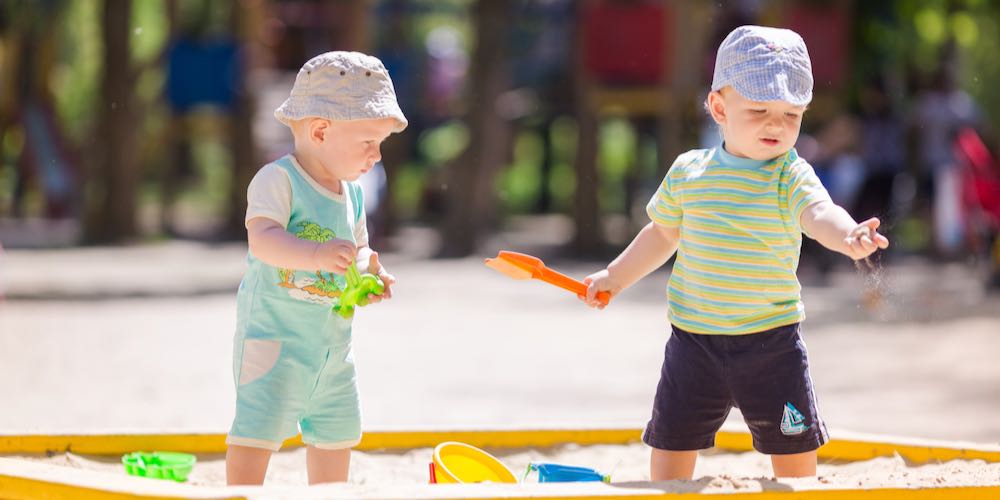The demand that criminals express remorse, preferably in extravagantly emotional terms, reveals a cultural tendency to place emotion above reason.
The Case Against Gentle Parenting
A few weeks ago, my youngest son (age two) had sand kicked in his face at a neighborhood playground. The sand-kicker looked like he was also two or three. His mother, who looked maybe a couple of years my junior (I’m 35), was hovering nearby and immediately intervened.
Well, sort of.
She knelt down to her son’s level and said, “That little boy might not like having sand kicked at him. Are you bored with the sandbox, and that’s why you’re kicking sand?” The kid did not respond. “Are you feeling tired?” Again, no response. I was tired just watching her.
“Maybe it’s time to try the slide?” The little boy pointed to the jungle gym, where there was indeed a slide. The mother took her child by the hand and led him away from the sandbox, saying “sorry” to me and receiving my “no worries!” in reply on her way. My son, after swiping at his sandy face, continued playing happily. I continued to sit on my shaded bench, on the other side of the small playground.
I felt sorry for this nice woman. I saw how closely she was hovering near her son while he played, and I noticed that she had offered him not one but four different snacks ten minutes before. It all added up.
I had placed her, even before the sand-kicking incident and subsequent feelings-centered redirection, as a likely victim of the latest fad in child-rearing: gentle parenting.
Feelings First
In a New York Times essay that begins with a playground anecdote similar to my own, Caitlin Moscatello defines gentle parenting as “an approach that steers away from punishment and focuses instead on helping children to become more self-aware.” Old reliable parental phrases from “stop it” to “because I said so” are verboten.
According to the Cleveland Clinic, instead of saying “Stop acting childish and put on your shoes,” parents trying to get a kid out the door in the morning could say, “When you don’t get ready on time, it hurts my feelings and makes me anxious. Why are you having a hard time?” Ostensibly, this approach shows “empathy and respect for how your child is feeling” and “center[s] how their actions directly impact how you feel.”
According to psychologist Becky Kennedy, who is quoted in Moscatello’s piece, today’s generation of parents understands that “feelings” are “the core of who you are” and therefore “feels like, I have one life. I want to feel good.”
Pardon my inability to find any gentle way to say this: so-called gentle parenting as defined above is antithetical to the very essence of parenting; it is also an affront to the barest notion of common sense.
Loving parents need to communicate two basic facts to children. First, you are the center of my world. Second, you are not the center of the world.
Gentle parenting communicates the first in a wholly dysfunctional way, and fails to communicate the second, because it is premised on the false notion that the correctness or incorrectness of all speech, behavior, and thought is dependent upon personal feelings—those of the child and those of the parent.
Actual parenting, by contrast, requires authoritative clarity about appropriate behavior to which parents (by virtue of their age and experience) have access, and children (by virtue of their youth and inexperience) do not. Moreover, it requires a concept of right and wrong that supersedes mere emotion.
Parenting in an Anomic Age
Many millennial parents come honestly by gentle parenting’s twisted perspective. For understandable reasons, they simply don’t understand what it actually takes to make our children feel like the emotional—not just logistical—centers of our worlds.
The college-educated people currently raising young kids in thrall to gentle parenting (and, make no mistake, formational years in a university are a necessary but insufficient condition to buy any of this nonsense) were mostly raised by baby-boomers—largely without the kind of extended family and community infrastructure that those boomers had themselves enjoyed as children. Many boomers that achieved financial security (and would therefore be likely to send their millennial children to college) had fewer children than their WWII generation parents; enjoyed the spoils of a hot economy that led to mc-mansions in the ex-urbs; and took their kids to church less and to travel soccer tournaments more. As a result, there were fewer older siblings, aunts, uncles, cousins, priests, and choir ladies around to share parental duties in the 1990s than in the 1960s. The upbringing of many millennials (and particularly of the white, upper-middle-class ones who would prove disproportionately vulnerable to the siren call of gentle parenting) was fairly anomic, compared with that of our boomer parents.
Because our parents were increasingly “parenting alone,” they loomed larger and less diluted in our lives than our grandparents had in theirs. Thus, when they parented “traditionally”—defined by the Cleveland Clinic as “yelling or screaming” due to “focus[ing] on your child’s action and the frustration it’s causing you”—they fostered in their children an overidentification with parental emotion. Parents’ feelings had such a powerful impact on millennials because these emotions were not offset, as in earlier eras, by the feelings of multiple other authority figures.
We want our sons to grow into honest men who can put their own feelings and those of others aside in deference to truth when necessary. That’s why we are unapologetically directive and (with rare exceptions) invite emotional reflection after, not before, exacting compliance.
Thus, many millennials’ emotional self-awareness was subsumed by self-doubt and repression, contributing to exactly the baseline “anxiety” that has made so many of us (and even more of our helicopter-parented Gen Z juniors) candidates for anti-anxiety medications. Gentle parenting nobly seeks to avoid sowing this kind of emotional distance between parents and children by rightly cautioning today’s parents—who have, in this anomic age, such outsized influence—to avoid burdening their kids with untutored, reactive emotions of anger and frustration.
Unfortunately, rather than countering that reactive indulgence of “traditional parenting” as the Cleveland Clinic defines it (and as many millennials no doubt experienced it) with an equally authoritative but responsibly stoic alternative, gentle parenting merely extends to children as well as parents the fundamentally misguided reliance on emotion as a substitute for authority.
In this way, millennial parents attempt to build emotional closeness with their children under the false pretense that the parent-child relationship is essentially one between equals. They focus on, in the words of one Connecticut mom quoted in Moscatello’s piece, “the relationship we are going to have with this child 20 years from now.”
But 20 years from now, our children won’t be children. While a loving and close relationship with our adult children is something we pray for, what we want for ourselves 20 years from now is frankly irrelevant to the parental vocation. The stewarding of our children’s intellectual and spiritual formation—not the enjoyment of their untutored, emotive existence—is the proper center of a vocationally parental world.
We are not tasked with “building a relationship” with our children. We are tasked, instead, with building our children’s relationships with the wider world—in all its sanctity and all its horror.
It’s Not Just the Two of Us
At bottom, gentle parenting discards the very concepts of truth and authority, in deference to the capricious tyranny of both parents’ and children’s feelings. The approach requires that parents model the kind of facility with emotional language that we want children to have. That’s why it is considered a good example of gentle parenting to say: “When you don’t get ready on time, it hurts my feelings and makes me anxious. Why are you having a hard time?”
There are two problems with a statement like this one, in a situation where a parent is trying to get out the door: First, the problem with not getting ready on time is that it is inconsiderate, inefficient, and disrespectful of others’ time; whether I “feel anxious” about it is wholly immaterial. Second, “why you are having a hard time being on time” is a conversation we by definition do not have time for in this circumstance. By beginning such a conversation in this moment, I am being inconsiderate and disrespectful toward whomever we are not on time for.
In other words: what’s right is right and what’s wrong is wrong, no matter how either the child or the parent feels about it. This is why any civilization that carves an ordered society out of the harsh barbarism of nature is built on rules, laws, and mores that incentivize and reward what is right while stigmatizing and penalizing what is wrong.
If I assault another woman on the street unprovoked, I am unlikely to be treated to a soliloquy on the anxiety of the police officer that responds to the scene. Nor am I likely to be asked why I am having a hard time. More likely, I will face some sort of criminal penalty—and rightly so. Then, likely, after getting over their shock and disappointment at my misbehavior, my husband and closest friends might inquire about the emotional frame of mind that led me to behave so badly.
Putting aside the different consequences of attending to a toddler and an adult, why should the sandbox be any different?
Our emotions are an expression of intimacy with those close to us, who care how we feel—not an arbiter of right and wrong in the wider world that we as parents are supposed to be preparing our children to both enter and serve.
My husband and I do want our sons to grow into empathetic men who can express their feelings and respect those of others. Modernity is not kind to men that lack facility with emotional language, nor is undue stoicism a recipe for fulfillment.
That’s why we try—very imperfectly and with great room for improvement—to project as a de facto setting the kind of calm demeanor that makes space for children who are developing the capacity to identify and articulate their feelings to be heard.
But, even more importantly, we want our sons to grow into honest men who can put their own feelings and those of others aside in deference to the truth when necessary. That’s why we are unapologetically directive and (with rare exceptions) invite emotional reflection after, not before, exacting compliance. Had the sand been kicked by the other foot that day on the playground—which it easily could have been, as my two-year-old is no angel—I would have handled things differently.
I would have addressed my kid by name and said, in a tone stern enough for this youngest of three brothers to know well that I mean business: “No! You do not kick sand. What do you say to that little boy?” Once the requisite apology was extracted, I would have explained, “Kicking sand in someone’s face can hurt his eyes. You don’t want to hurt him.” If my kid kicked sand again after that, I would have removed him from the sandbox—not as a diversion to something else fun like a slide, but as punishment for unallowable behavior.
I know that’s what I would have done because it’s what I have done countless times in relation to each of my children. Now, I’m increasingly able to sit across the playground from my two-year-old, who is getting better at playground etiquette.
Meanwhile, I rarely so much as glance at my eight- or six-year-old playing with others. It’s been that way for several years. Fortunately, they’ve mostly imbibed the disciplinary orientation toward misbehavior that is so anathema to gentle parenting—and so indispensable to functional living.
To me, this indicates that my sons have a prayer (by no means a guarantee, but at least a chance) of one day being fit for productive adult lives in a world that is sorely in need of people able to separate what they feel from what is true.
So just maybe, 20 years from now, my sons might be men worth having relationships with. Not just as sons, but as spouses, brothers, friends, and colleagues.
Perhaps even as parents—God-willing, the kind with their heads on straight enough to eschew any inane fads that impede this all-important work.


